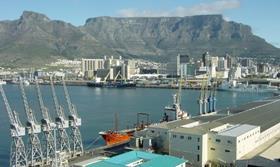
Growers in the Cape region of South Africa have been battling a drought for the past two years, but adverse wind conditions have now added to the industry's problems, causing further disruption.
This weekend gale force South Easter winds not only caused the cancellation of one of the world’s premier cycling races in Cape Town, it also led to delays in the shipping of fruit from Cape Town’s container terminal.
At least one container vessel has been trapped in the port, while another had to ride out the storm in the bay waiting for a berth.
The container vessel MSC Algeciras was still in port Monday morning as the strong winds over the bay caused a cancellation of all loading for most of Saturday and Sunday. Gusts of wind in excess of 100km per hour was recorded in the city.
One logistics operator confirmed that loading resumed later on Monday, but said the wind delays have made things very difficult for shippers. “The MSC Algeciras was due to sail on Saturday night and is now two days overdue. It does not only affect this vessel, but also activities scheduled for this week.”
In Cape Town, the 35,000 participants in The Argus Cycle Race around the Cape Peninsula were disappointed when the race was cancelled for safety reasons after only a few managed to start. There were strange scenes as competitors were blown off the road at the start.
Elsewhere in the Cape Peninsula, a massive fire destroyed a huge section of one of the informal settlements in Hout Bay, with a number fatalities. Food that was destined for the cyclists on the road, were diverted to the victims.
Amongst the 35,000 entrants were nearly 5,000 from overseas, while inside South Africa cyclists travelled across the country to Cape Town to participate.
Wind delays in Cape Town is not unusual this time of the year with the Cape Town Container Terminal located in a particularly vulnerable spot, and in recent years these incidents have become more frequent.
Meanwhile Cape Town and its surrounding areas remain in the grip of one of the worst droughts in history. The prospect that the region may well run out of water within the next three months if there is not enough rain, has become a reality for all those living in the region.






No comments yet